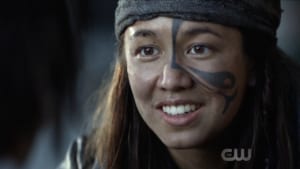As much (valid) criticism as The 100 gets for its portrayals and treatment of certain disadvantaged groups, the storylines of its two most prominent disabled characters have proved pleasantly surprising in depth and nuance. Raven’s and Emori’s arcs intersected in the most recent episode, 4×08 “God Complex”, and I think now is a great time to compare and contrast these two characters’ journeys and evaluate the cultural impact of their stories being featured on the show.
Up ’til now…
Raven Reyes, a series protagonist, was not only born able-bodied but started the show in season 1 as an able-bodied character. Initially, she existed as an alternative love interest for Finn to cause conflict between him and Clarke. Of course, she has always been badass and brilliant, but her introduction as his pre-existing girlfriend was a pretty obvious ploy. The fact that she outlived ‘attractive and rogueish’ white boy Finn is remarkable. That is not to say she was not otherwise useful – in fact, Raven is one of the most valuable members of Skaikru, and has been since she became the munitions expert for the Delinquents in season 1. Unfortunately, at the end of that season she got shot by John Murphy in an attempt to rescue Bellamy from him. This resulted in spinal cord damage that led to chronic pain and reduced ability in her left leg.
 The equally badass Emori was also introduced as a potential love interest, but for the aforementioned John Murphy. She made her first appearance late in season 2 and has been a recurring character in seasons 3 and 4. Unlike Raven, Emori was born disabled. Cast out of her clan as an infant because of her mutant hand, she was forced to take up a life of crime in order to survive. She found a home of sorts with other mutants, including Otan, whom she referred to as her brother, but has always existed on the fringes of society.
The equally badass Emori was also introduced as a potential love interest, but for the aforementioned John Murphy. She made her first appearance late in season 2 and has been a recurring character in seasons 3 and 4. Unlike Raven, Emori was born disabled. Cast out of her clan as an infant because of her mutant hand, she was forced to take up a life of crime in order to survive. She found a home of sorts with other mutants, including Otan, whom she referred to as her brother, but has always existed on the fringes of society.
Murphy advised her to leave Polis in 3×12 “Demons” because it was not safe for her in the city, a sentiment she echoes in 4×01 “Echoes” (you’re welcome). From this, one can assume that mutants in Grounder society face not just expulsion from their clans, but further abuse if they attempt to reintegrate.
“You were loved. Told you were special. I was thrown away like someone’s garbage. You know nothing of my pain.” –Emori to Clarke, 4×07 “Gimme Shelter”
Being born with her disability, Emori is very used to it and seems unbothered by the fact that one of her hands is disfigured and (presumably) has reduced fine motor skills. She’s much more concerned with the way society treats her because of her appearance. In the City of Light where she doesn’t have to fear being attacked, she forgoes her glove and displays her mutation openly. When Jaha reminds her that she can correct her defects there, she proudly retorts, “I would, if I had any.”
I love the disability positivity inherent in that statement, and it’s a sentiment that needs to be on television. Also great in terms of representation is how Emori does all the things able-bodied people do (probably with some modifications as needed). She’s not lauded as being “inspirational” for it, but yet her disability is never forgotten because it has had a huge impact on her life.
Raven’s struggle, conversely, is with the loss of abilities she once had. She acquired her disability after meeting most of the main characters, so she is not treated much differently for it in a social sense, other than everyone now questioning what she can handle. It is always good-natured questioning, people just trying to help, but it is exhausting and othering for Raven.
 She has also had a difficult time accepting her limitations or that the disability may be permanent. There was a chance that she might be able to be treated at Mount Weather early in season 3, but when it was blown up by the Ice Nation, so was the possibility of her returning to her former level of ability. Her despondency and feelings of uselessness after Abby spelled out that her leg would never heal and refused to clear her for patrol were what drove Raven to take A.L.I.E.’s chip, even more so than the freedom from pain that was promised to her. A.L.I.E. understood that. The first thing she said to her was, “Time to get back to work, Raven.”
She has also had a difficult time accepting her limitations or that the disability may be permanent. There was a chance that she might be able to be treated at Mount Weather early in season 3, but when it was blown up by the Ice Nation, so was the possibility of her returning to her former level of ability. Her despondency and feelings of uselessness after Abby spelled out that her leg would never heal and refused to clear her for patrol were what drove Raven to take A.L.I.E.’s chip, even more so than the freedom from pain that was promised to her. A.L.I.E. understood that. The first thing she said to her was, “Time to get back to work, Raven.”
“Everyone thinks they have an idea on how to help me feel better. Stay in camp. Only do jobs where I can sit down. Ask every time I need something on a high shelf. But you know what? I’m not that person. People think I can just change and my pain will go away, but I can’t. I can’t do that and I can’t do this!”–Raven to Jaha, 3×05 “Hakeldama”
My feelings on this development, the finality of Raven’s disability, are mixed. On the one hand I am proud of The 100 for avoiding the trope of making a character disabled just for the sake of healing them, and for not turning her into some kind of inspiration porn. On a personal level, I would love to see Raven healed because she has been to hell and back. At the same time I appreciate the depiction of a struggle I can identify with. Lots of people with acquired disabilities do not return to their previous levels of health/ability, and watching that internal struggle play out on screen has undoubtedly been cathartic for many of us, if a little too close to home.
As someone with an acquired brain injury, I relate very strongly to Raven’s struggle. Neither of us knows how to chill out or is willing to accept that she may now be capable of less and might have to find other ways to be useful. If Raven is anything like me, she no doubt has run through that moment many times in her mind.
She probably ruminates on alternatives. If only she had not gone into the dropship basement to save Bellamy, or if only she hadn’t made a noise that drew Murphy’s gunfire. If only Murphy wasn’t such a dick, or if only Bellamy hadn’t let the group hang Murphy for a murder he knew Murphy didn’t commit. What if Bellamy hadn’t told Charlotte to slay her demons, or if Charlotte had not taken him so literally? The events leading to Raven’s injury were senseless and completely avoidable, which only makes it all the more frustrating.
Let’s talk about sex
Before moving on to the episode that prompted this piece, I want to briefly return to the subject of representation and “normal” things these characters do. Sex, namely. Both Raven and Emori have enjoyed a sexual relationship while disabled on The 100. That isn’t abnormal for disabled women, but it is something we rarely see on screen. Further, the show avoided the temptation to only imply their sexual encounters to avoid having to address their disabilities.
Murphy and Emori have not had anything more than “getting dressed/undressed while kissing” type moments aired so far, though the season 4 trailer has a steamy shot of Emori kissing a shirtless Murphy, so that could be around the corner. And lo and behold, there is a more explicit deleted scene on the interwebs, one that I assume was cut because “Hakeldama” was a jam-packed episode. I am including it here so you don’t have to search for it and because hot damn.
http://jontyaxefive.tumblr.com/post/147695150456/memori-deleted-scene-3×05
Though Raven has not had a love interest for a while except for Luna, she was briefly involved with Wick at the end of season 2, and they got quite the hot scene of their own.
Emori and Raven’s disabilities are acknowledged in the scenes, but they don’t detract from them. On the contrary, they add emotional depth and make the scenes about more than the physical connection. For Emori, it’s the moment when her hand is resting on John’s chest and he takes it in his. Her insecurity shows for a moment there before he regains eye contact and she doesn’t see the disgusted reaction to her hand that she is used to. For Raven, it’s when Wick’s hand trails down to her brace and he breaks the awkward moment by joking that the brace he designed for her would have been easier to take off. It’s obnoxious, but that is basically Wick’s defining characteristic, so it works.
For a show that seems to love doing “brave/groundbreaking” things like killing the lesbian with a bullet intended for her lover or killing the black guy first, this is actually somewhat groundbreaking. Not brave, because really there is nothing brave about portraying minorities as humans with human desires. But it’s a rare facet of disabled representation, and something I appreciate nonetheless.
4×08 “God Complex”
Okay, on to the latest episode. Raven and Emori were part of the group that travelled to Becca’s island together in 4×04 “A Lie Guarded”, but we see no significant interactions between them until 4×08. The episode’s title refers to both Jaha’s continued messiah complex and Clarke and Abby’s decision to test Emori in the radiation chamber. Contrast that with 1×04, when Clarke refused to let Bellamy kill Murphy because “We don’t decide who lives and dies.” Clarke has come a long way.
 Anyway, Roan and the Griffins seem to use the excuse that Emori lied about the random Grounder’s identity (to make sure he got tested and she wouldn’t) to justify testing her after his gory death. I actually think Emori was right that she is the first person they would have picked anyway. Clarke and Abby ultimately save their own people first, and Emori is the most expendable of the Grounders. Not necessarily because of her disability, but because the others are the last known Nightblood and the King of Azgeda. However, Emori has long felt expendable because of her disability, for good reason, and it was enough to make her want to bolt in the previous episode.
Anyway, Roan and the Griffins seem to use the excuse that Emori lied about the random Grounder’s identity (to make sure he got tested and she wouldn’t) to justify testing her after his gory death. I actually think Emori was right that she is the first person they would have picked anyway. Clarke and Abby ultimately save their own people first, and Emori is the most expendable of the Grounders. Not necessarily because of her disability, but because the others are the last known Nightblood and the King of Azgeda. However, Emori has long felt expendable because of her disability, for good reason, and it was enough to make her want to bolt in the previous episode.
“They’re gonna sacrifice someone to test nightblood. Who do you think that’s gonna be, huh? Clarke? Raven? I’m the outsider, John, the frikdreina.” –Emori to Murphy, 3×07 “Gimme Shelter”
When Murphy and Emori are cuffed to the rocket and Murphy pleads with Raven to stop the others from doing this to them, Raven immediately comes to Emori’s defense. When Roan tries to justify Emori’s potential death and refers to her by her disabled status while doing so, Raven quickly shuts that down. She’s also disgusted by the idea of Abby taking Luna’s bone marrow without her consent, as the same thing happened to her in Mount Weather at the hands of the Mountain Men.
Raven is the moral center of this episode, hands down. She says what everyone knows but is too afraid to face. Yes, Clarke ultimately makes the decision to test herself instead, and Murphy’s impassioned rant to her has a lot to do with that. Still, Raven was sowing seeds of doubt in her and Abby throughout the episode, setting the stage for that change of heart. Clarke trusts Raven and her opinion means a lot to Clarke, much more than Murphy’s.
Roan: “If the frikdreina dies-”
Raven: “Don’t. Call her that.”
-re. Emori in 4×08 “God Complex”
 Despite their differences in terms of clan, social status, and lifelong versus acquired disability, Raven no doubt empathizes with Emori’s feelings of expendability. I think when she hears Roan call Emori the Grounder word for mutant, which is clearly is rooted in the slur “freak,” it resonates with her because her body doesn’t work like most people’s anymore. Though it appears relatively normal, that brace is a signifier of her difference. And with her diminished capacity, she feels expendable sometimes too. She’s brilliant, of course, but she knew when the crew was splitting up to look for Luna in 4×04 that she’d be the one staying behind to guard the boat. (Even that is generous. Miller literally said, “Stay under the trees, you’ll be safe here.”)
Despite their differences in terms of clan, social status, and lifelong versus acquired disability, Raven no doubt empathizes with Emori’s feelings of expendability. I think when she hears Roan call Emori the Grounder word for mutant, which is clearly is rooted in the slur “freak,” it resonates with her because her body doesn’t work like most people’s anymore. Though it appears relatively normal, that brace is a signifier of her difference. And with her diminished capacity, she feels expendable sometimes too. She’s brilliant, of course, but she knew when the crew was splitting up to look for Luna in 4×04 that she’d be the one staying behind to guard the boat. (Even that is generous. Miller literally said, “Stay under the trees, you’ll be safe here.”)
Raven recognizes those feelings of being othered and undervalued. However, she is far from expendable, and Emori’s above quote regarding who would get picked shows that she understands Raven’s value to Skaikru. But maybe once she gets to know Raven better which better effing happen, she will come to see the things they have in common as well.
Watching Raven stand up for Emori and demand the others show her respect was a joy, especially considering her struggles to accept her own disability. Disabled women of color supporting disabled women of color for the win! They are two of my favorite characters and my newest BroTP, and I hope we get to see more of them together in the last 5 episodes of the season.
The 100 returns to The CW April 26 at 9 PM EDT.


